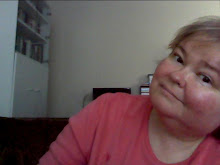
My friend Haruko. Linda and I were just wondering about Haruko yesterday, and what do I see in the paper today? An article quoting her. She's a major mover in the anti-nuclear movement in Japan. I copy the article form the Globe and Mail below.
'It's been 60 years, and people are forgetting'
By Geoffrey York
HIROSHIMA, JAPAN -- The A-bomb survivors knew their peace movement was in trouble when they were banned by an Atlanta school board and heckled by hostile Americans at a peace march in Washington.
The elderly survivors of Hiroshima are rarely invited to speak to the world's children these days. The global mood has turned hawkish. New countries are acquiring nuclear weapons. And with the U.S. administration refusing to co-operate, the latest disarmament talks at the United Nations collapsed in disarray this year.
For decades, the Japanese survivors were the heart and soul of the global peace movement. Now their generation is dying, and the world's memory of Hiroshima is fading. Even with the 60th anniversary of the atomic bomb approaching on Aug. 6, few people are listening to their message.
One of the most poignant symbols of their movement -- the concept of "ground zero" as the epicentre of the first nuclear blast -- has been appropriated by New York, where the phrase now refers to the location of the events that occurred there on Sept. 11, 2001. Those attacks and the more recent ones in London, rather than the decades of nuclear terror that began in Hiroshima and Nagasaki, dominate today's global consciousness.
"Most of those with direct memories of the atomic bomb will pass away in the near future," said Chisako Takeoka, a 77-year-old survivor who found her mother's horribly injured body among the wreckage of Hiroshima.
"It's a big challenge for us. We're asking the younger generation to carry on our stories."
Hiroshima was the dawn of an era of nuclear dread. Even when the Cold War ended, the nuclear powers maintained their missile arsenals and new states joined the nuclear club. Nuclear weapons are millions of times more powerful than anything that hit New York or London or Madrid in recent years, yet their presence has fallen off the world's mental map.
Ms. Takeoka, like hundreds of other survivors in Hiroshima, has dedicated her life to educating the world about the effects of nuclear bombs. But even as nuclear weapons spread to new countries, from North Korea to South Asia, she sees the world losing interest.
"People are more interested in the anti-terrorism campaign," she said. "The focus has shifted away from nuclear weapons. Of course the war against terrorism is important, but nothing can compare to the horror of a nuclear bomb."
Today's nuclear weapons, thousands of times more powerful than the bomb that fell on Hiroshima, would cause the slaughter of all humanity, she said. "I feel very sad about the world. I have a feeling that ultimately some country will use nuclear weapons again."
For more than 35 years, the city of Hiroshima has protested against every nuclear test around the world, acting as a voice of conscience for the victims of nuclear attacks. For a while, the protests seemed to be making progress. After hitting a peak in 1987, the number of nuclear tests declined sharply when the Cold War ended and dwindled to almost none in 2000. But since Sept. 11, 2001, the nuclear tests have gained momentum again.
The protest letters, signed by the mayor of Hiroshima, cover four walls at the Peace Museum in Hiroshima, reaching a total of 588 today. Nine nuclear tests have been conducted since Sept. 11, 2001, eight by the United States and one by Russia. There are so many protest letters that the display space is running out. Just six more letters can be posted in the museum exhibit before the walls are filled.
The backlash against the atomic bomb survivors is already beginning.
One group of Hiroshima and Nagasaki survivors and children of survivors was invited to speak to a high school in Atlanta in 2002, but the invitation was abruptly cancelled.
"It was done at the 11th hour, at night," said Haruko Moritaki, whose father lost an eye to shrapnel when the bomb fell on Hiroshima. "We were labelled as opponents of George Bush. Most ordinary Americans have learned no lessons from Hiroshima and Nagasaki."
When the survivors joined a peace march in Washington, they were jeered by passersby who shouted, "Go home!" and "Remember Pearl Harbor!"
Peace education, once a mandatory subject in Japanese classrooms, is now disappearing from the curriculum.
Shoji Kihara, a peace activist and son of two Hiroshima survivors, said Japanese schools have largely eliminated the peace memorial meetings and peace textbooks that were common in the past.
"There used to be so many teachers who were survivors, but now they are mostly retired," he said. "The second and third generation of teachers don't know the reality of the A-bomb. It's been 60 years, and people are forgetting about Hiroshima and Nagasaki. But the world is more dangerous than ever."
Last spring, the Hiroshima survivors watched the collapse of the latest UN review of the nuclear Non-Proliferation Treaty. At the previous review, five years earlier, the United States had agreed to affirm the long-term goal of all nations to eliminate nuclear weapons. But this year the review fell apart because the United States refused to co-operate on disarmament issues.
"These are dark days for the peace movement," said Sunao Tsuboi, an 80-year-old Hiroshima survivor.
Still, he is not giving up hope. "We're in a transition period. But in the long run, I'm convinced we will win. The wind against us always makes us more determined."
Sunday, July 31, 2005
Posted by
Anna Haight
at
10:20 AM
![]()
Subscribe to:
Post Comments (Atom)










No comments:
Post a Comment